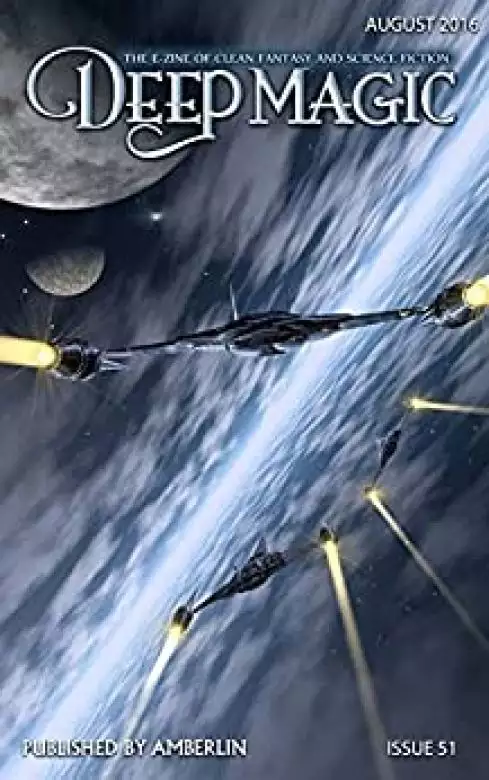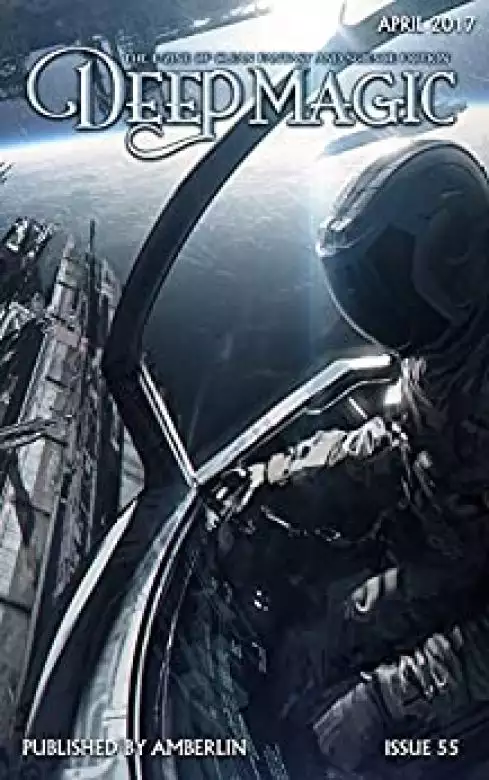THORNS
by Eldon Thompson
Pagus leaned into his work, moving the rake efficiently among the hedgerows of his master’s private garden. It was light toil, really. In some ways, he rather enjoyed it. The garden was beautiful, to be sure, a flowering profusion of sweet scents and vibrant colors. More importantly, it was a place of quiet, the one location to which he could escape to be alone with his thoughts. Sometimes, while laboring among the plants and shade trees, he was able to forget almost completely the truth of his place in the world. Despite the aches and pains and occasional blister, it was perhaps the most enjoyable of his duties.
He bent to pick up a stone. As he came up, another bounced at his feet, as though falling from an overhead tree. He looked up, scanning the foliage. Sure enough, there was Fabius, crouched on a portico rooftop that lay beyond the encircling wrought-iron fence, upon the perimeter of the surrounding peristylium, his ruddy face creased with a stupid grin. Pagus watched as the son of Master Cornelius reached into a leather pouch, pulled forth a stone, and flung it right at him. It was a good throw. Pagus actually had to dodge in order to avoid a nasty thump to the skull.
Biting back his anger, Pagus turned to collect the stones. He could hear Fabius’s laughter as he worked, and did his best to ignore the continuing barrage, other than to note where each missile had landed so that he could retrieve it. He wondered briefly how severe might be the punishment should he decide to throw one or more of them right back. It might well be a price worth paying. Nevertheless, it was a passing thought. He had no wish to embarrass himself or his master, who would suffer insults from the community for having selected such a rebellious youth as his chief servant. Nor did he wish to give Fabius the satisfaction of a reaction of any sort. In the end, it was best for all to just keep silent.
“Fabius,” a voice rang out severely.
From where he knelt, Pagus glanced up to see Cornelius Jucundus, duumvir of Pompeii, cutting a path through the inner courtyard. The master’s eyes were fixed upon his son’s rooftop position. From the corner of his eye, Pagus watched as Fabius withered beneath his father’s stern gaze, abandoning his assault and slinking from view. When he had gone, Master Cornelius produced a key and stepped through the gate that marked the entrance to his garden, approaching Pagus’s location.
Pagus rose to his feet and bowed. “I am sorry to have offended him, Master.”
Cornelius shook his head. “It would seem my son is offended with life, these days. We can only hope he will outgrow it.”
Pagus bowed again.
“May I?” Cornelius asked.
Pagus stepped out of the way, allowing his master to walk past until he had reached an array of rosebushes that sprouted in the exact center of the garden. One rose in particular stood tall and proud among the others, its stem stripped of thorns, save one. Cornelius did not hesitate, but reached up and pressed his thumb squarely upon the tip of the thorn, wincing only slightly as he drew blood. He then tipped his head back and drew a deep breath, closing his eyes against a stream of sunlight. At last, he turned and walked back toward the garden entrance, pausing to place a hand upon Pagus’s shoulder as he went.
“Life grants us another day,” the older man said.
Pagus nodded, then faithfully repeated his half of the ritualistic exchange. “Let us do with it as we may.”
Cornelius patted the younger man on the shoulder, leaving him to his work.
* * *
Pagus lay in his private quarters that night, thinking as he often did of who he was and who he might one day be. He had just about fallen asleep when the attack woke him. Though he could not remember any sensory triggers, he must have felt it coming, for he bolted upright in bed an instant before it happened, his eyes snapping open to stare into moonlit darkness. As soon as he did so, the attacker was there, pressing a dagger against his throat. Pagus held his breath as a sneering face thrust into view.
Fabius.
Pagus blinked several times to be sure of what was happening. He started to speak, but the other signaled silence. A moment later, Fabius whispered, “We’ve been summoned.”
Pagus swallowed hard and nodded, doing what he could to disguise his fear. He must have failed, because Fabius’s smirk only widened as he pulled Pagus to his feet.
Moments later, they had worked their way outside the house and into the streets. A gusting wind blew down the roads and alleys, chilling Pagus’s skin. Pagus shivered, but said not a word. He glanced continually at Fabius, who prodded him forward with the dagger, saying nothing about where they were going, or why.
At the end of the block, Fabius shoved him into an alley. There, Pagus came face-to-face with a young man, a beggar by the looks of him. After a moment, however, Pagus was surprised to realize that he recognized the lad.
“Lucretius,” Pagus whispered in stunned greeting.
Lucretius hissed at him to be silent, then motioned both Pagus and Fabius into the deep shadows. There, he took a moment to look Pagus up and down, as though sizing him up for some task. “Congratulations, Pagus,” he said finally. “You are about to win your freedom.”
Pagus stared at the young man, dumbfounded. Lucretius was well known to him, a chief servant with whom he had often met. The boy’s master was none other than Sallust Severus, a close friend of Master Cornelius and a prominent citizen in his own right.
Lucretius cast about furtively, then produced a folded square of leather. He opened it up to reveal what appeared to be an oily frog skin.
“Poison,” he explained. “A venom that, when it reaches the bloodstream, can fell a horse within minutes.”
Pagus studied the item, then looked up at Lucretius, making no attempt to hide his confusion.
“My master wishes to be elected duumvir next month. He would not care to lose to yours a second time.”
Pagus gaped wordlessly. He glanced at Fabius. “You’re going to poison your father?”
Fabius snickered. “No, Pagus. You are.”
Pagus groped for a response that would not come, his lips forming any number of unspoken words. “I . . . I have no cause,” he stammered at last.
“No cause?” Fabius laughed quietly. “You’re a slave, Pagus.”
“You are being given an opportunity,” Lucretius agreed, pulling forth a scroll and extending it to him. “Do this one thing, and my master is prepared to secure your freedom.”
Pagus accepted the scroll, and after a moment’s hesitation, read its inscription. A sudden twinge tickled his spine. The writ was a proclamation of freedom, signed already by Sallust Severus, duumvir of Pompeii. Help the man to assume the position, and he would be free.
Pagus glanced quickly between the two conspirators, horror and disbelief vying for control of his features. “Why me?”
Again, Fabius laughed, this time, without any trace of mirth. “You are the only one, other than Father, with access to his private garden. Who else?”
“I am to poison the man in his own house?”
“The venom must enter the bloodstream,” Fabius said, reiterating Lucretius’s description. He stared at Pagus meaningfully.
Pagus shook his head, as if by doing so he might clear away this curious nightmare. What had Master Cornelius ever done that he should help to take the man’s life? “I cannot do this,” he said at last.
“Be smart,” Lucretius urged him. “Your master is not long for this earth. Do not suffer for some misguided loyalty. Take this opportunity to profit from his demise.”
Pagus turned back to Fabius. He could deduce easily enough the son’s stake in this affair. With Cornelius gone, Fabius would become master of House Jucundus. What would it be like working as a slave under the ill-tempered youth?
But Fabius was quick to abolish any such notions. “Refuse this act,” he said, “and I will see you branded a thief. You will not escape the lions this time.”
Lucretius took back the scroll and plucked forth a bag of coins, which he pressed into Pagus’s hand. “This is but a first payment,” he promised. “You shall be paid thrice over when the deed is done.”
Pagus stared wide-eyed into the open bag, feeling its weight bearing down upon him. He looked slowly from one face to the other, still unable to believe this was happening. He had heard of such murderous intrigue, certainly. But to be drawn into such a plot, here and now . . .
He continued to glance from one face to the next. He could not trust either of these men; that much was obvious. But considering the choices . . . He stared down at the bag of gold, more wealth than he could spend in a lifetime. He thought of all the good he might do with it. He thought of the words of his own master, who had often shared with him philosophies concerning the cycle of life. Death is necessary, Cornelius would claim without a hint of regret. The old must die that the young may take their place. A more natural progression did not exist.
A cloud passed overhead, dimming the light of the moon. A night bird offered up a shrill cry. Pagus wondered suddenly whether one of his children or servants would one day be crouched in an alley, plotting his own unnatural demise.
“Give me the poison,” he said.
We hope you are enjoying the book so far. To continue reading...
Copyright © 2026 All Rights Reserved






